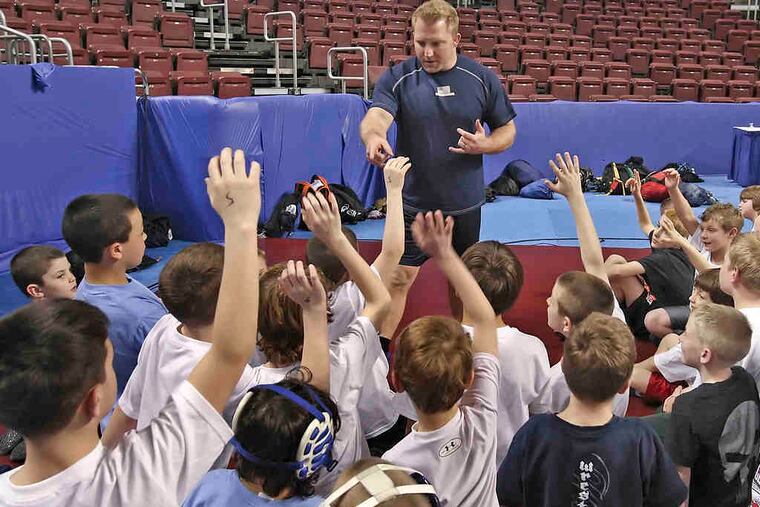Philly kids find wrestling beats the streets
IT LOOKED LIKE a normal practice. There were kids in shorts and wrestling shoes, drilling on the mats with their coaches like they do on most winter afternoons.

IT LOOKED LIKE a normal practice. There were kids in shorts and wrestling shoes, drilling on the mats with their coaches like they do on most winter afternoons.
This just happened to be the coolest wrestling practice of all time.
"I've never seen this many wrestling mats in one place, ever," said Xavier Fountain, a 12-year-old from Martin Luther King Youth Wrestling in West Oak Lane. "This is awesome."
Some 200 youth wrestlers, most from Philadelphia's Beat the Streets program, yesterday drilled on eight brand-new mats set up for this week's NCAA Division I Wrestling Championships in the Wells Fargo Center. Brett and Clinton Matter, former Penn wrestlers from Delran, N.J., brought the nonprofit to Philadelphia in an effort to sell wrestling to inner-city youth. They had some impressive salesmen on the mats yesterday, too, including Olympic gold medalists and NCAA champions.
"You guys ever seen cauliflower ear before?" Matt Valenti, a two-time NCAA champion for Penn, asked a group of kids.
The youngsters nodded in amazement at Valenti's hardened, puffy ears, but many eyes drifted up toward the massive scoreboard looming above their heads. Getting the kids a little awestruck by the NCAA championships was part of the plan.
"For these kids to come here and see how far you can come with this sport is amazing," said Rashaan Hornsby, whose 11-year-old son, Rashaan Jr., wrestles for the Camden Wolverines.
Starting tomorrow, 330 of the nation's best wrestlers will fill the Center in an attempt to win a national championship. Most of those wrestlers were on the mats before kindergarten in suburban youth programs, and in many cases, their fathers, uncles and brothers wrestled, too.
In cities like Philadelphia and Camden, however, basketball and winter track rule the winter months. Economic and cultural issues don't help the sport's inner-city appeal, either.
"I'll be honest, not many African-Americans see other African-Americans succeed in the sport. That hurts," said Dominic Castelli, head coach at Martin Luther King High School. "There's more and more succeeding on the collegiate level, and that's helping."
Castelli resurrected the team at Martin Luther King High this school year and competed in Philadelphia's Public League. While he is happy with his team's effort, he knows filling the ranks with kids who understand the sport can make all the difference.
"I didn't get to start wrestling until I was in 10th grade. We're behind when we come in, but things like this can help," said James Clacks, a coach for Martin Luther King's youth program.
Barry Strube, chairman of Public League wrestling, said dispelling myths about wrestling and making the sport more mainstream in the city is a constant challenge.
"It's just not something these kids see on a daily basis," he said. "Inner-city budgets are slim, and when programs get cut, it's not basketball."
Strube said the Public League had nine varsity teams plus three schools that had just established programs. In the past, there were as many as 14, he said.
Last month, Edison won its first Public League wrestling title with a 37-26 victory over Northeast. Coach Ali Hyman, a former wrestler at La Salle University, said the school rallied around the team, and opened some eyes about wrestling.
"A lot of people just don't get wrestling and they don't give it a chance," he said. "We had a lot of people come watch us. We made the school proud."
Chris Hanlon, executive director of Beat the Streets, says city wrestlers aren't on a par with those in the suburbs and don't go deep into the state tournament, but that's the goal.
"They get clobbered outside the city," he said. "But it's no mystery on how wrestlers get good. It's experience."
Before they began drilling last night, the young wrestlers also were schooled on themes such as responsibility, dedication and setting goals. Getting into a top Division I program isn't going to happen on skills alone, they were told.
"If I wasn't studying at the same time I was wrestling, there's no way I would have gotten into Penn," said Brandon Slay, an All-America and gold medalist at the 2000 Olympics in Sydney.
Using wrestling as a way to mentor the kids is the ultimate goal of Beat the Streets, said Hanlon.
"Wrestling changes everything," the former Penn wrestler said. "It can literally change a person's life."
The NCAA is donating $25,000 to Beat the Streets this week, and the organization will use the money to buy headgear, singlets and mats, which can cost thousands themselves. They even help bring back programs from the dead.
"I contacted them, told them my story, and they made it happen," Castelli said. "They helped with everything."
In Camden, Beat the Streets helped establish the first youth program in decades and bought new mats. Rashaan Hornsby Jr., also a budding hip-hop artist, is one of the team's stars this year, compiling an 11-2 record. He said he would love to perform at the Wells Fargo Center in the future, whether it's on the mat or a stage.
"I know it's possible now," he said.
At Camden High, wrestling would probably be over the day Hedley Thame decides to retire. Since 1976, Thame rarely has had a full team and has amassed more losses than he can count. But wrestling got its hooks into Thame long before he started coaching, and he's hoping the ever-growing number of inner-city programs in the area is a sign of an urban renaissance on the mats.
"Retire?" Thame said. "I'm filling out the orders for next year's equipment right now."